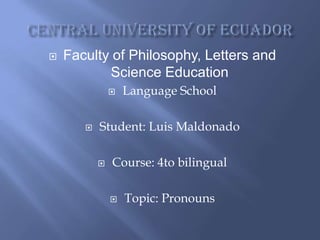
Luis Maldonado Universidad Central del Ecuador(Pronouns)
- 1. Faculty of Philosophy, Letters and Science Education Language School Student: Luis Maldonado Course: 4to bilingual Topic: Pronouns
- 2. pronoun Pronoun is the grammatical category that denotes a thing, person, without naming, denoting, in turn, grammatical persons. Pronouns can be personal, possessive, relative, inte rrogative and indefinite.
- 3. Personal pronouns are used to designate the people and take different forms depending on the trade (subject, direct object, indirect object or complement circumstantial) that play in the sentence. English personal pronouns take the following forms.
- 4. Singular I-Yo(ai) You- Tú,Usted(iu) He-Él(ji) She-Ellas(shi) It-(It refers to the abundant nouns have no real sex- pencil, pen, or impersonal verbs. When acting as a subject usually not translated into Spanish.).
- 5. You- We- Nosotros(ui) Vosotros, Ustedes(iu) They- Ellos, Ellas(dei)
- 6. A personal pronoun refers to a person or thing and changes its form to indicate person, number, gender and case. Subjective personal pronouns. A subjective personal pronoun indicates that the pronoun acts as a subject of prayer. Are subjective personal pronouns "I," "you," "she," "he," "she," "we," "you", "them". example: I was glad to find tickets in the backpack of Luis, he had saved.
- 7. An objective personal pronoun indicates that the pronoun is acting as an object of a verb, compound verb, preposition, or infinitive phrase. The objective personal pronouns are "I", "you," "she," "he," "she," "us", "you" and "them". Example: Christopher was talking while he was working.
- 8. A possessive pronoun indicates that the pronoun acts as a marker of possession and defines who owns a particular object or person. The possessive pronouns are "mine" "yours," "your," "your", "their", "our" and "them". Note that possessive personal pronouns are very similar to possessive adjectives like "my," "she" and "your". In each of the following sentences, the highlighted word is a possessive personal pronoun: The smallest gift is mine. Here the possessive pronoun "mine" functions as a subject complement.
- 9. A demonstrative pronoun points to and identifies a noun or pronoun. "This" and "these" refer to things that are close in space or time, while the "what" and "that" refer to things that are farther away in space or time. The demonstrative pronouns are "this", "what", "these" and "them". "East" and "who" used to refer to singular nouns or noun phrases and "these" and "who" used to refer to plural nouns and noun phrases. Note that the demonstrative pronouns are identical to demonstrative adjectives, but obviously that use them differently. It is also important to note that "it" can also be used as a relative pronoun. example: This must not continue. Here "this" is used as the subject of the compound verb "must not continue."
- 10. An interrogative pronoun is used to ask questions. The interrogative pronouns are "who," "who," "to," "what" and the compounds formed with the suffix "ever" ("who", "who","whatever", and "whatever" ). Note that it is "that" or "what" can also be used as an interrogative adjective, and "who", "who" or "that" can also be used as a relative pronoun. You will find "who", "who" and occasionally "which" is used to refer to people, and "what" and "what" is used to refer to things and animals. "Who" acts as the subject of a verb, while "which" acts as the object of a verb, preposition, or verbal. They want to see the dentist for the first time? "What" is the subject of the sentence.
- 11. A relative pronoun is used to link one phrase or clause to another phrase or clause. The relative pronouns are "who", "who", "it", and "that". Compounds of "who", "who" and "what" are also relative pronouns. You can use the relative pronoun "who" and "who" to refer to the subject of a clause or sentence, and "who" and "who" to refer to objects of a verb, a verb or preposition. example: You can invite who likes to party. The relative pronoun "who" is the direct object of the compound verb "may invite".
- 12. An indefinite pronoun refers to an identifiable individual, but it is not specified or thing. An indefinite pronoun conveys the idea of all, some, none, or few. The most common indefinite pronouns are "all", "other", "any", "no", "no", "no", "every one", " everyone", "all", "all" "a few "" many "," no "," none "," a "," several "," some "," someone ", and" someone ". Note that some indefinite pronouns can also be used as adjectives indefinite. example: Many were invited to dinner, but only twelve showed up. Here "many" acts as the subject of compound verb "were invited."
- 13. You can use a reflexive pronoun to refer back to the subject of the clause or sentence. Reflexive pronouns are "I", "yourself", "yes", "self", "self", "us", "you" and "themselves". Consider each of these can also act as an intensive pronoun. example: Diabetics give themselves insulin shots several times a day.
- 14. An intensive pronoun is a pronoun used to emphasize its antecedent. Intensive pronouns are identical in form to reflexive pronouns. The highlighted words in the following sentences are intensive pronouns: I myself believe that aliens should abduct my sister. The Prime Minister said he would lower taxes. They promised to come to the party even though he had a final exam at the same time.
- 15. THANK YOU…!!!
